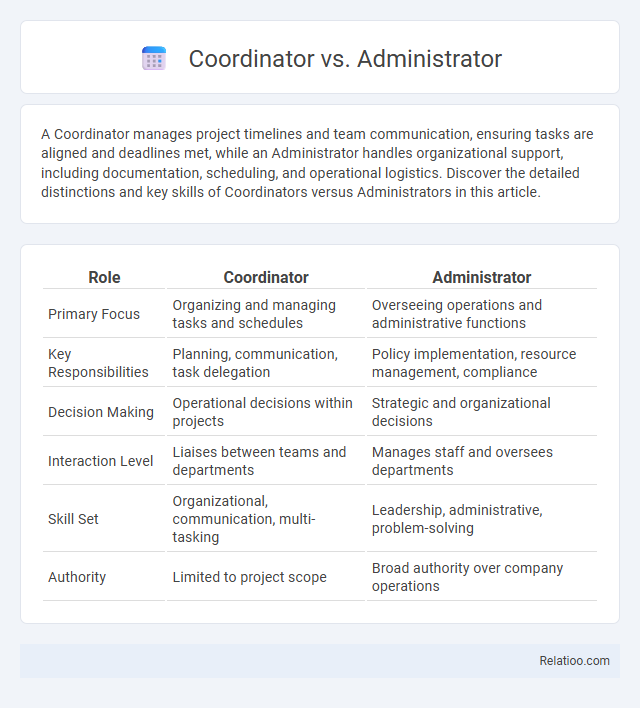A Coordinator manages project timelines and team communication, ensuring tasks are aligned and deadlines met, while an Administrator handles organizational support, including documentation, scheduling, and operational logistics. Discover the detailed distinctions and key skills of Coordinators versus Administrators in this article.
Table of Comparison
| Role | Coordinator | Administrator |
|---|---|---|
| Primary Focus | Organizing and managing tasks and schedules | Overseeing operations and administrative functions |
| Key Responsibilities | Planning, communication, task delegation | Policy implementation, resource management, compliance |
| Decision Making | Operational decisions within projects | Strategic and organizational decisions |
| Interaction Level | Liaises between teams and departments | Manages staff and oversees departments |
| Skill Set | Organizational, communication, multi-tasking | Leadership, administrative, problem-solving |
| Authority | Limited to project scope | Broad authority over company operations |
Introduction: Understanding Coordinators and Administrators
Coordinators manage specific projects or teams, ensuring tasks align with organizational goals and deadlines, often focusing on operational details. Administrators oversee broader organizational functions, including policy implementation, resource allocation, and workflow optimization to maintain overall efficiency. Understanding these roles clarifies how coordinators handle day-to-day execution while administrators provide strategic support and governance.
Defining the Roles: Coordinator vs Administrator
A Coordinator manages specific projects or teams, facilitating communication and ensuring tasks align with overall goals, whereas an Administrator oversees organizational operations, such as managing resources, policies, and administrative support. Coordinators often focus on day-to-day project execution and team collaboration, while Administrators handle broader operational responsibilities including budgeting, compliance, and strategic planning. The distinction lies in Coordinators executing focused activities within departments, whereas Administrators maintain organizational infrastructure and governance across multiple functions.
Key Responsibilities of a Coordinator
Coordinators manage project timelines, facilitate communication between teams, and ensure tasks align with organizational goals, prioritizing effective collaboration and resource allocation. They monitor progress, address operational issues, and report updates to stakeholders to maintain workflow efficiency. Unlike administrators who focus on policy enforcement and administrative duties, coordinators drive the execution of specific projects or programs.
Primary Duties of an Administrator
The primary duties of an administrator include overseeing organizational operations, managing resources, and ensuring compliance with policies and regulations. You are responsible for strategic planning, coordinating departments, and facilitating communication between management and staff to maintain efficiency. These tasks distinguish administrators from coordinators, who typically focus on specific projects or event organization rather than broad operational management.
Required Skills and Qualifications
Coordinator roles require strong organizational skills, multitasking abilities, and proficiency in communication tools, often demanding a bachelor's degree in business or related fields. Administrator positions prioritize technical expertise, experience with system management, and leadership skills, typically requiring certifications like PMP or ITIL along with a relevant degree. Your ability to adapt these qualifications to the specific demands of each role ensures effective team management and project execution.
Workplace Settings and Environments
Coordinators typically operate within dynamic workplace settings such as project teams and event planning environments, emphasizing communication and task alignment. Administrators are often found in structured office environments or organizational departments, managing systems, records, and operational workflows to ensure smooth functioning. Both roles require adaptability, but coordinators focus on collaborative environments while administrators prioritize regulatory compliance and administrative efficiency.
Salary Expectations and Career Growth
Salary expectations for Coordinators typically range from $40,000 to $60,000 annually, while Administrators often earn between $55,000 and $80,000, reflecting their broader management responsibilities. Career growth for Coordinators usually involves advancing to senior or specialist roles, whereas Administrators have greater potential to move into executive or director-level positions. Your choice between these roles should consider both immediate compensation and long-term advancement opportunities in organizational leadership.
Core Similarities Between Coordinators and Administrators
Coordinators and administrators both play vital roles in organizing and managing tasks to ensure smooth operations within an organization. They share responsibilities like overseeing project timelines, facilitating communication among team members, and ensuring compliance with policies. Your ability to delegate, prioritize, and monitor workflows is essential in both positions, highlighting their core functional similarities.
Major Differences: Coordinator vs Administrator
A Coordinator primarily manages specific projects or teams, ensuring smooth execution and communication, while an Administrator oversees operational functions and organizational policies, often handling broader administrative tasks. Coordinators focus on task alignment and team support within projects, whereas Administrators emphasize office management, resource allocation, and strategic oversight. The major difference lies in the scope of responsibility: Coordinators handle project-specific coordination, and Administrators manage overall organizational administration.
Choosing the Right Role: Career Considerations
Choosing the right role between Coordinator, Administrator, and Manager depends on career goals, desired responsibilities, and industry demands. Coordinators often focus on executing tasks and supporting project workflows, ideal for those seeking hands-on experience and skill development. Administrators typically handle organizational processes and system management, suited for individuals aiming for operational control, while Managers lead teams and strategic planning, fitting those aspiring to leadership and decision-making roles.

Infographic: Coordinator vs Administrator
 relatioo.com
relatioo.com